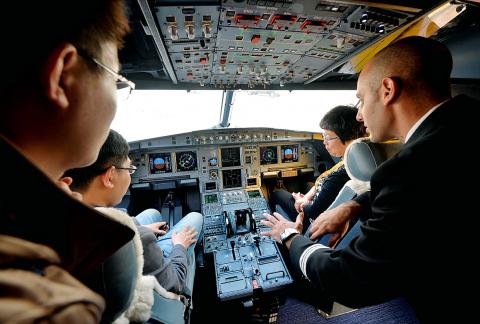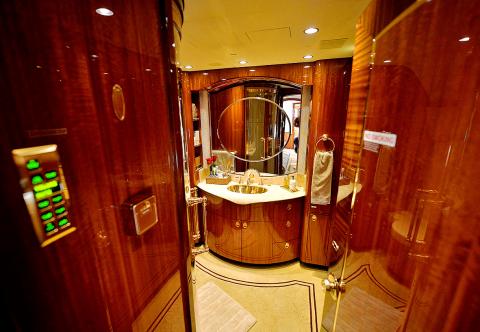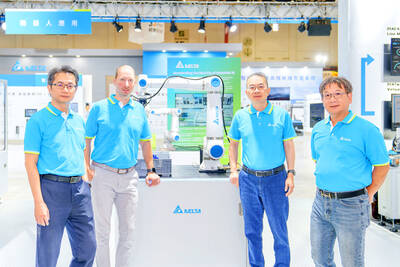When a Chinese customer asked for the interior of his new Bombardier Challenger 850 jet to be covered with pricey black carbon fiber, the designer was shocked — but happy to oblige.
“We’ll do whatever you want, as long as it’s within the realm of certification,” said Sean Gillespie, executive vice president for sales of Flying Colors, a North American aviation services firm.
“But carbon fiber, we’ve used it before, but usually it’s used as a trim,” he said.

Photo: AFP
The market for private jets — sometimes called business or executive jets — is a small but fast growing aviation segment in China, where rapid economic development has created a surge of new wealth.
The first US Gulfstreams only arrived in the country in 2003, but a decade later there were 248 business jets in China, a 28 percent leap from 2012’s figure, consultancy Asian Sky Group said.
Customers include Jack Ma (馬雲) of e-commerce giant Alibaba (阿里巴巴), in the process of a multibillion-dollar share offer in the US, and Wang Jianlin (王健林) of Dalian Wanda Group (萬達集團), which bought the US cinema chain AMC.

Photo: AFP
“Buyers can be in their 20s, in their 70s. They can be in real estate, investment, oil and gas. They are from all over China,” said Jason Liao, head of consultancy China Business Aviation Group.
“There is no typical Chinese buyer,” he said.
One thing they have in common: tens of millions of US dollars available to buy their own planes. European firm Airbus has just started offering an US$80 million budget version of its corporate jet in China, with a pre-designed cabin instead of a fully-customized one.
They can be swayed by the little details. So Gulfstream has a place for a rice cooker on board, Brazil’s Embraer can sync an iPad to adjust lights and climate control, and Airbus offers a round table for playing mahjong.
Chinese billionaires’ most common destinations are nearby Asian cities such as Hong Kong, Macau and Singapore for gambling and entertainment, but they nonetheless prefer “long range, big cabin” aircraft with the ability to cross the Pacific and bring North America within reach, Airbus and Ledbury Research said in a report.
Even so, manufacturers are quick to promote planes as a business tool, rather than a toy of the rich.
There are some dark clouds on the horizon for the market: more moderate economic growth and limits on flight paths since most of China’s airspace is controlled by the military, along with a lack of infrastructure for private planes.
China has just 286 landing sites suitable for these types of aircraft, state media say.
“There are some challenges with airspace, with airport take-off and landing restrictions,” said Scott Neal, senior vice president for sales and marketing at Gulfstream.
At the moment, potential buyers are also eager to keep a low profile amid an ongoing government austerity campaign and anti-corruption drive launched after Chinese President Xi Jinping (習近平) took over as head of the Chinese Communist Party at the end of 2012.
“If you back up two years ago, this market was really happening very fast and was kind of electric,” Boeing Business Jets president Stephen Taylor said.
“It definitely has been less aggressive and a more subdued market ever since the new administration came in and started pushing against some of the luxury items,” he said.
Asian Sky’s general manager Jeffrey Lowe added: “Maybe not getting into the biggest and flashiest airplane is certainly the best approach these days.”
However, he said, “other than that, they still have a definite need for the aircraft and most of them are finding ways to buy.”
At a recent air show in Shanghai a middle-aged man sat near a Gulfstream display, but declined to give his name and attributed his presence to his tall companion, introducing her as a fashion designer.
“I only came along because my girlfriend wanted to look at planes,” he said.

SETBACK: Apple’s India iPhone push has been disrupted after Foxconn recalled hundreds of Chinese engineers, amid Beijing’s attempts to curb tech transfers Apple Inc assembly partner Hon Hai Precision Industry Co (鴻海精密), also known internationally as Foxconn Technology Group (富士康科技集團), has recalled about 300 Chinese engineers from a factory in India, the latest setback for the iPhone maker’s push to rapidly expand in the country. The extraction of Chinese workers from the factory of Yuzhan Technology (India) Private Ltd, a Hon Hai component unit, in southern Tamil Nadu state, is the second such move in a few months. The company has started flying in Taiwanese engineers to replace staff leaving, people familiar with the matter said, asking not to be named, as the

The prices of gasoline and diesel at domestic fuel stations are to rise NT$0.1 and NT$0.4 per liter this week respectively, after international crude oil prices rose last week, CPC Corp, Taiwan (台灣中油) and Formosa Petrochemical Corp (台塑石化) announced yesterday. Effective today, gasoline prices at CPC and Formosa stations are to rise to NT$27.3, NT$28.8 and NT$30.8 per liter for 92, 95 and 98-octane unleaded gasoline respectively, the companies said in separate statements. The price of premium diesel is to rise to NT$26.2 per liter at CPC stations and NT$26 at Formosa pumps, they said. The announcements came after international crude oil prices

STABLE DEMAND: Delta supplies US clients in the aerospace, defense and machinery segments, and expects second-half sales to be similar to the first half Delta Electronics Inc (台達電) expects its US automation business to remain steady in the second half, with no signs of weakening client demand. With demand from US clients remaining solid, its performance in the second half is expected to be similar to that of the first half, Andy Liu (劉佳容), general manager of the company’s industrial automation business group, said on the sidelines of the Taiwan Automation Intelligence and Robot Show in Taipei on Wednesday. The company earlier reported that revenue from its automation business grew 7 percent year-on-year to NT$27.22 billion (US$889.98 million) in the first half, accounting for 11 percent

A German company is putting used electric vehicle batteries to new use by stacking them into fridge-size units that homes and businesses can use to store their excess solar and wind energy. This week, the company Voltfang — which means “catching volts” — opened its first industrial site in Aachen, Germany, near the Belgian and Dutch borders. With about 100 staff, Voltfang says it is the biggest facility of its kind in Europe in the budding sector of refurbishing lithium-ion batteries. Its CEO David Oudsandji hopes it would help Europe’s biggest economy ween itself off fossil fuels and increasingly rely on climate-friendly renewables. While